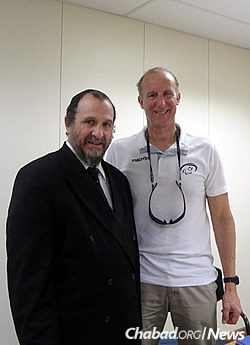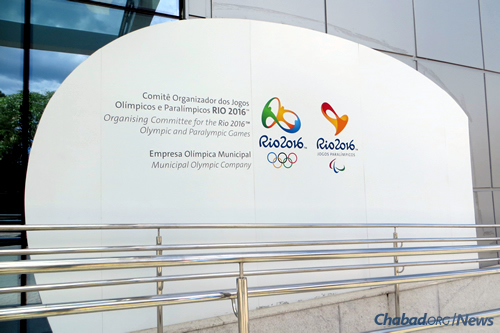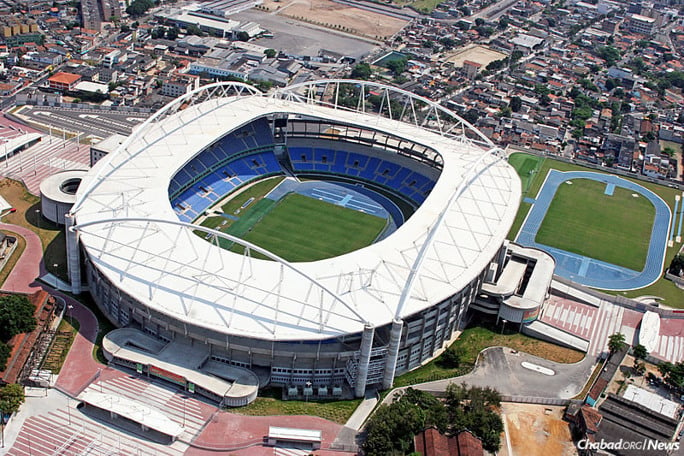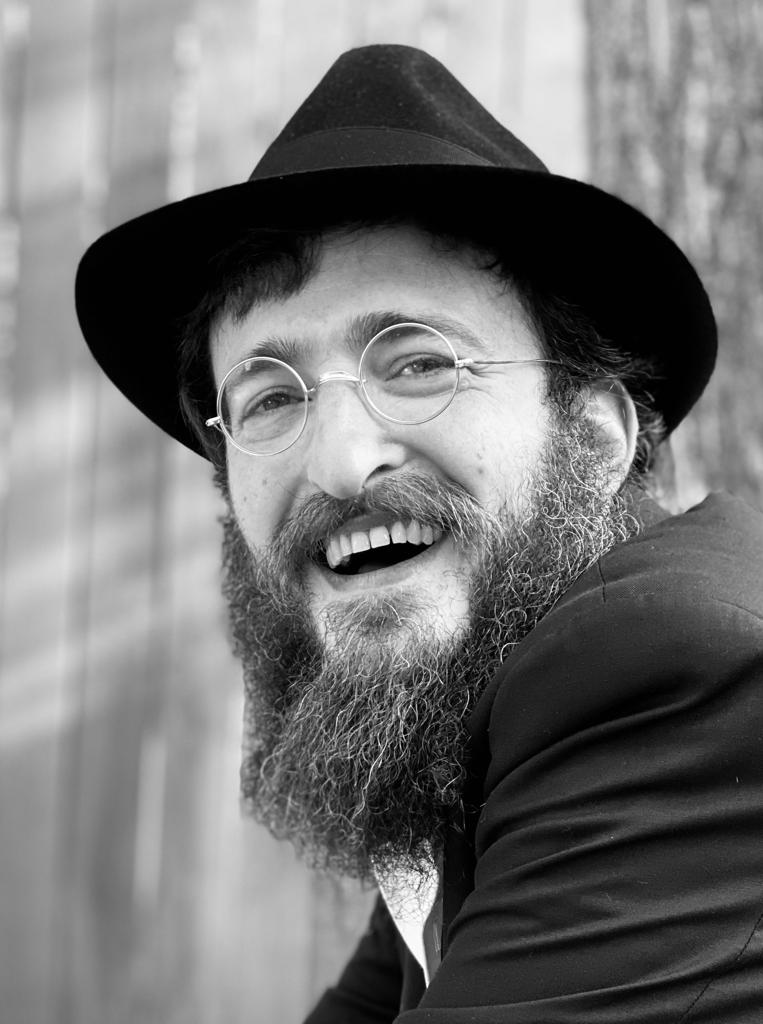So, you’re a Jewish tourist in Rio de Janeiro for Brazil’s Summer Olympics and find yourself wandering about on the honking streets of Copacabana. Where do you go for kosher food? How do you find a minyan? What if you’re struggling with the language or can’t figure out how to hail a cab? What address do you turn to?
The storefront on Av. Nossa Sra. de Copacabana, 581, loja 3 will likely be your best bet. That’s where Chabad-Lubavitch of Rio, which has been preparing for the massive event for months, is setting up a temporary Jewish welcome center to greet some of the 40,000 Jews expected to arrive for the games, a quarter of them Israeli. Staffed by four rabbinical students arriving from New York—there will be a total of 12 rabbinical students in Rio for the Games—Chabad of Rio’s welcome center in that neighborhood will remain open for the duration of the Olympics and the Paralympics that are to follow.
“It’s a large premises right in the center of Copacabana,” says Rabbi Ilan Stiefelmann, who is coordinating the site. “It’s really the perfect location for us to be able to greet Jewish visitors.”
Chabad has played a vital and central role in greeting and caring for the needs of Jewish visitors during past Olympics, including in London, Beijing and Athens, as well as at the Winter Games held in Sochi, Russia; and Vancouver, British Columbia. Jewish travelers have grown accustomed to Chabad being their source for religious and spiritual engagement during their stay, and being there to provide any other necessary help, and Rio will be no different.
While the largest contingent of foreign visitors will descend on Copacabana, Chabad will operate two other Jewish welcome centers: one at Chabad Rio’s main center in the Leblon neighborhood; and the other at the Chabad center led by Rabbi Yosef Simonowits in Barra da Tijuca, the Rio neighborhood home to the newly constructed Olympic stadium and where most of the sporting events will take place.
Like Copacabana, Leblon is home to popular tourist hotels, and Goldman says they will be seeing a massive uptick of tourists.

“We’re preparing for about 500 additional people to join our synagogue each Shabbat,” says Rabbi Yehoshua Goldman, co-director of Chabad of Rio. “The Olympics are less than two months away, so more and more people are calling now.”
Goldman acted swiftly after representatives of Israel’s Paralympics team reached out to his office in February. The result was that his synagogue, Beit Lubavitch Rio De Janeiro, will host an official Shabbat program for the entire team, including providing accommodations for athletes and staff who are Shabbat-observant.
“We’re excited to provide a warm welcome to all guests, of course,” says Goldman, “but the entire community is particularly happy to be able to host the Paralympic team. It’s going to be a very special Shabbat.”
Goldman adds that rabbinical students will be on hand in the Leblon neighborhood as well. Through the assistance of Rabbi Moshe Kotlarsky, vice chairman of Merkos L’Inyonei Chinuch—the educational arm of the Chabad-Lubavitch movement—the young rabbis are being sent to Rio to bolster Chabad’s Jewish engagement during the Olympics. The students speak a number of languages—English, Hebrew, Spanish, French and Russian—to facilitate easier communication with the Jewish visitors they encounter, who will hail from around the world.

At Home in the Village
Goldman and his colleague Rabbi Eliyahu Haber were appointed by the Brazilian Olympic Committee to serve as two of the three Jewish chaplains at the 2016 Summer Games. It was in that capacity that the two rabbis headed out last week to Rio’s Barra da Tijuca suburb, where the brand-new Olympic Village has been built adjacent to the stadium.
“Each religion is receiving a room at the Olympic Village, and they asked us to come down to view the different options and see what will work best for the Jewish community’s needs there,” explains Goldman.

As in the three hubs Chabad has set up to cater to Jewish visitors, the Jewish room at the Olympic Village will be staffed at all times by rabbinical students and will be stocked with kosher food, prayer materials and tefillin. Special food for Shabbat, including wine and challah, will be on hand as well.
For months, Goldman has been working on arranging a kosher concession stand be allowed to operate at the actual Olympic Stadium—not uncommon at other sporting events—but permission has still not been forthcoming.
“The people here, the Brazilian Olympics Committee, they are all very supportive of having a kosher food concession stand at the stadium,” says Goldman. “From what I understand, it needs to be approved by the International Olympic Committee, so hopefully, that can still happen.”







Start a Discussion